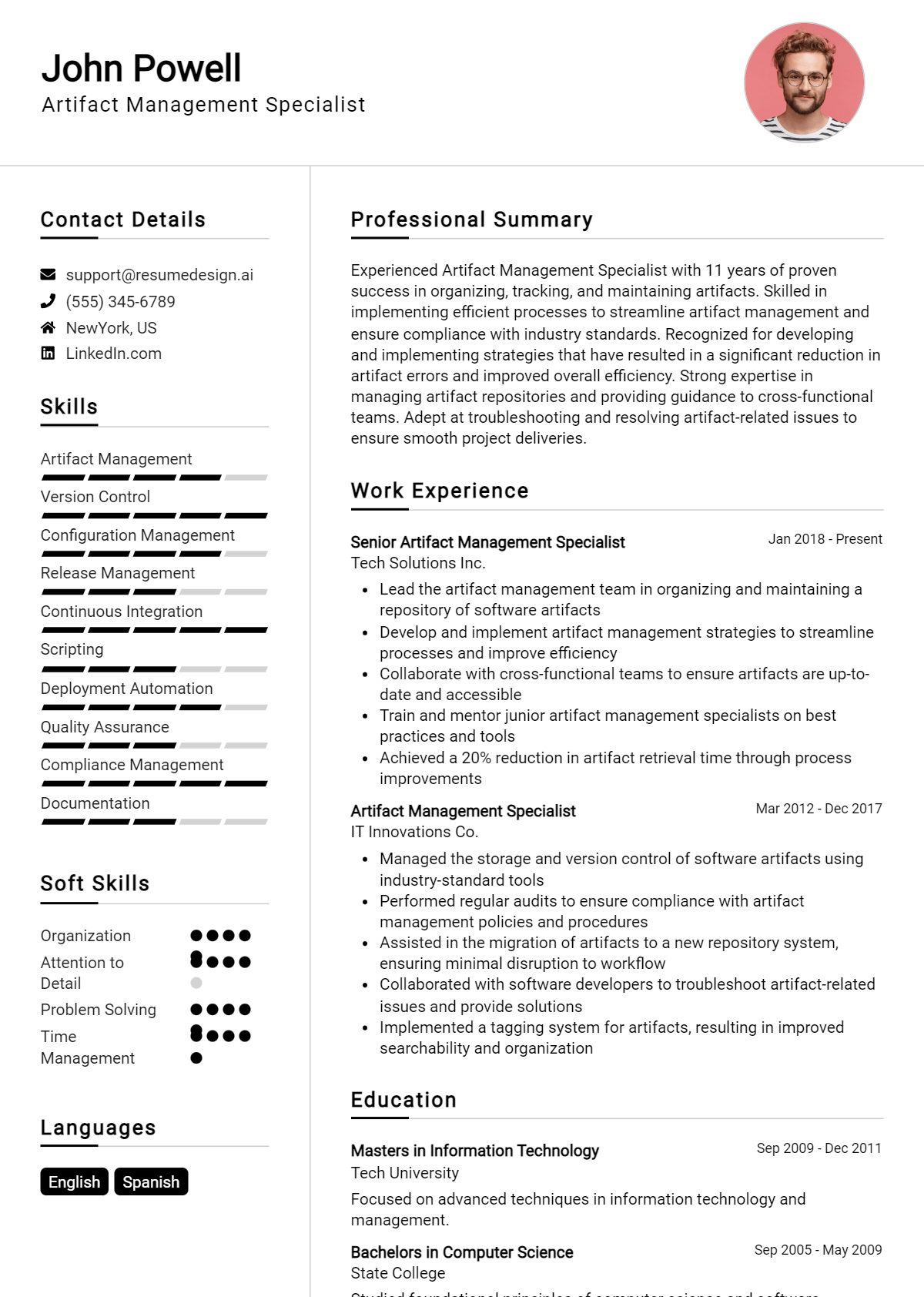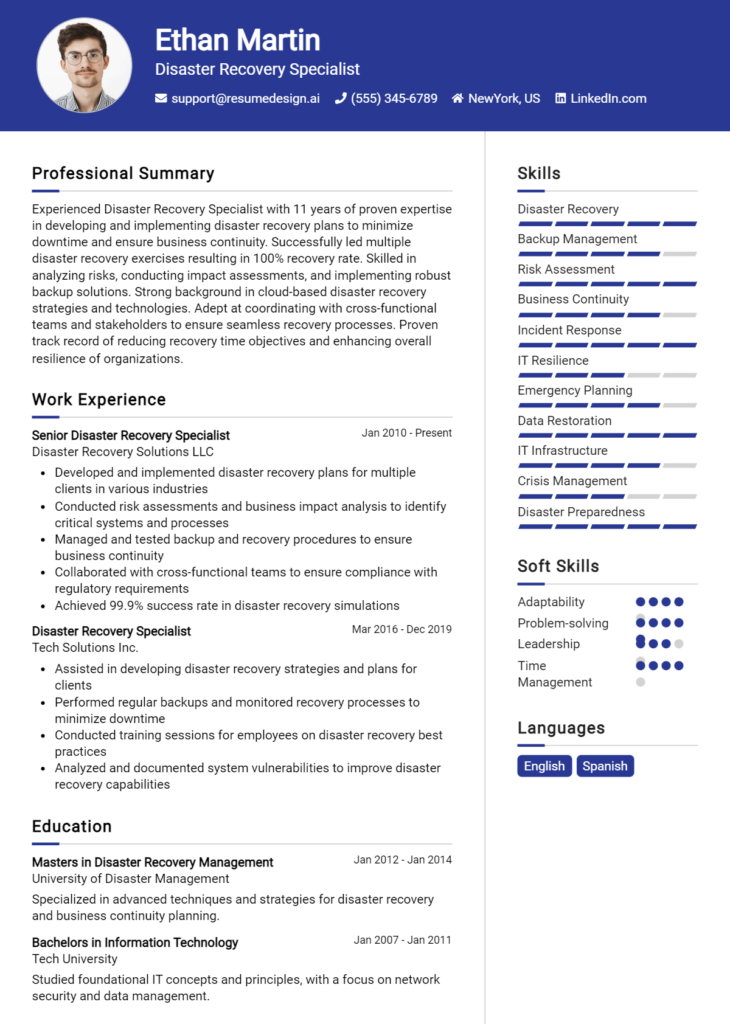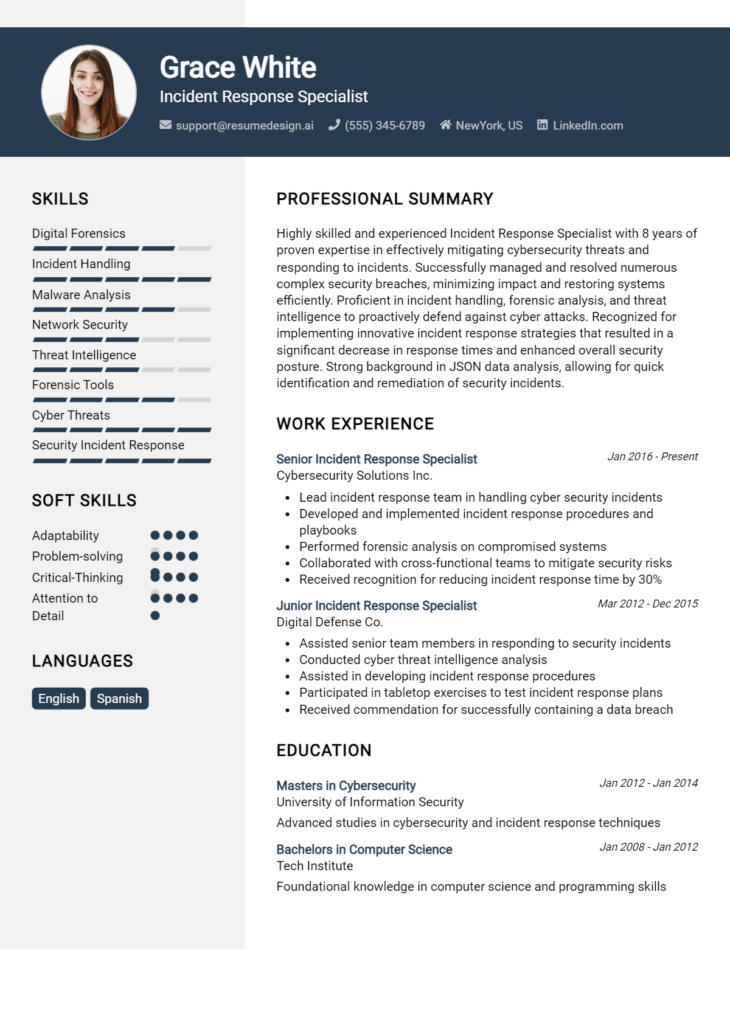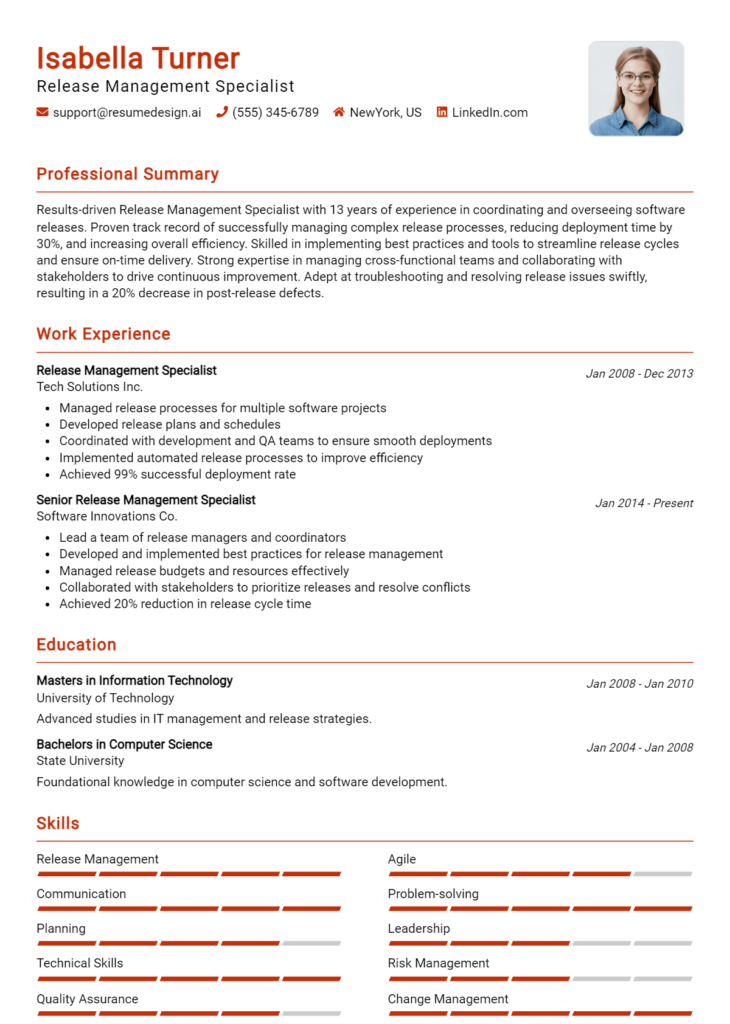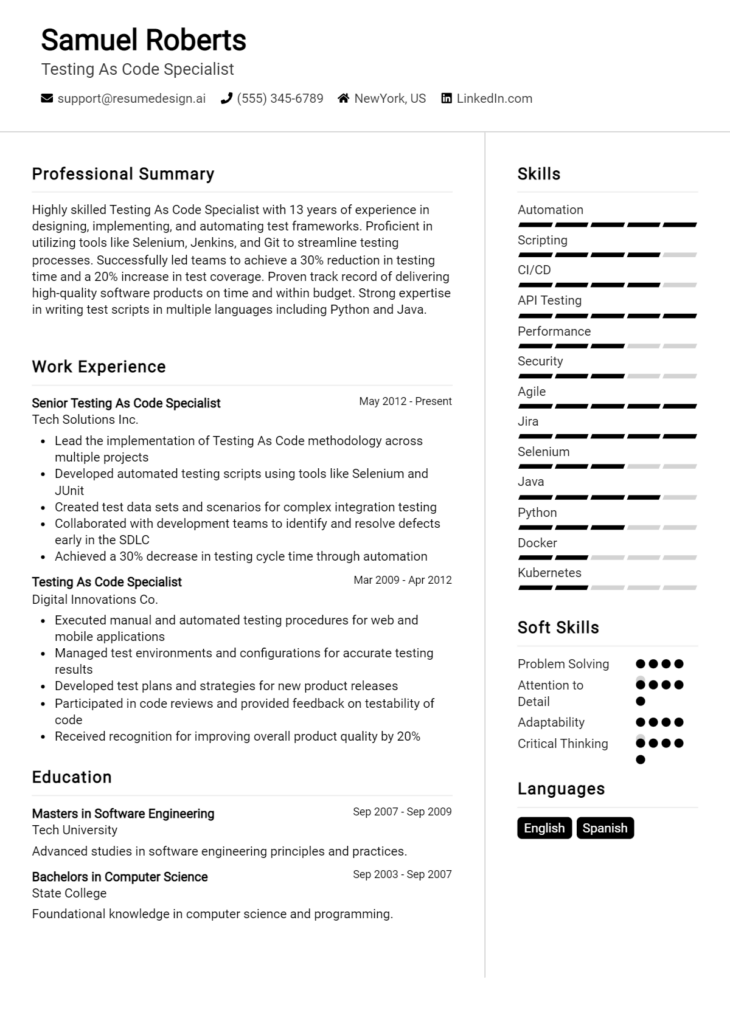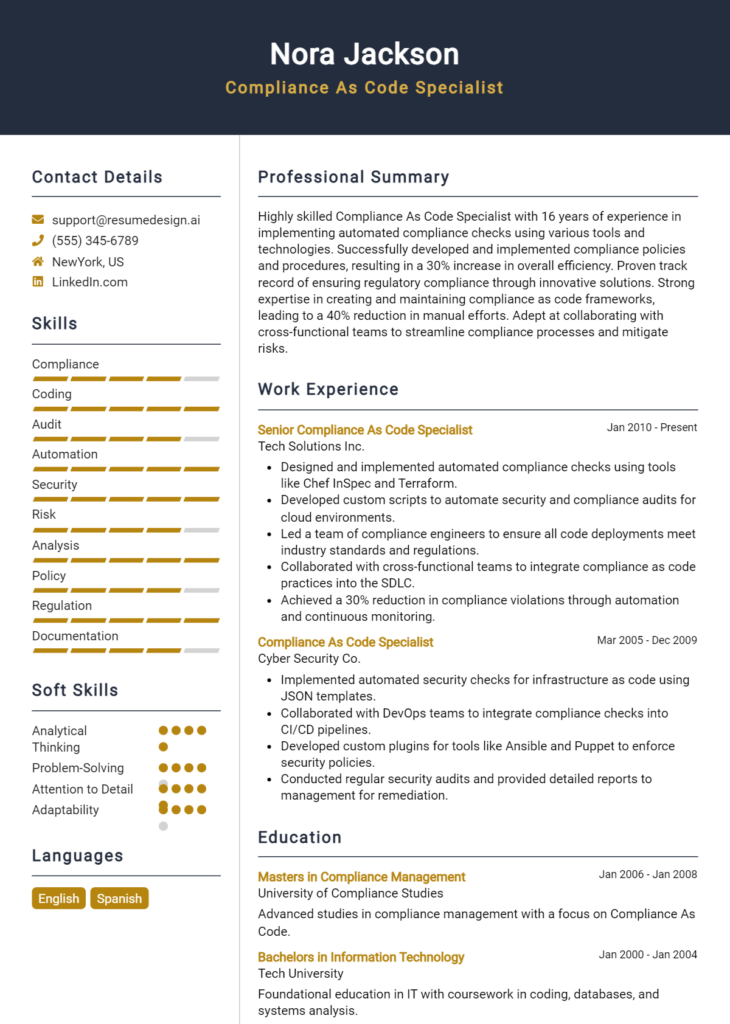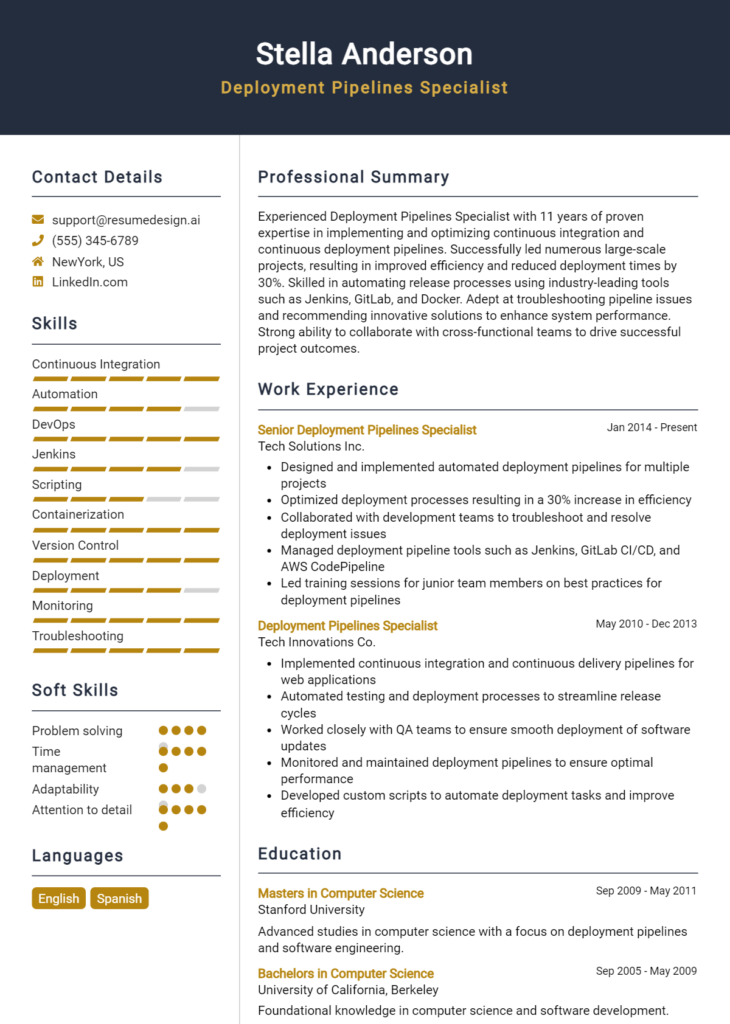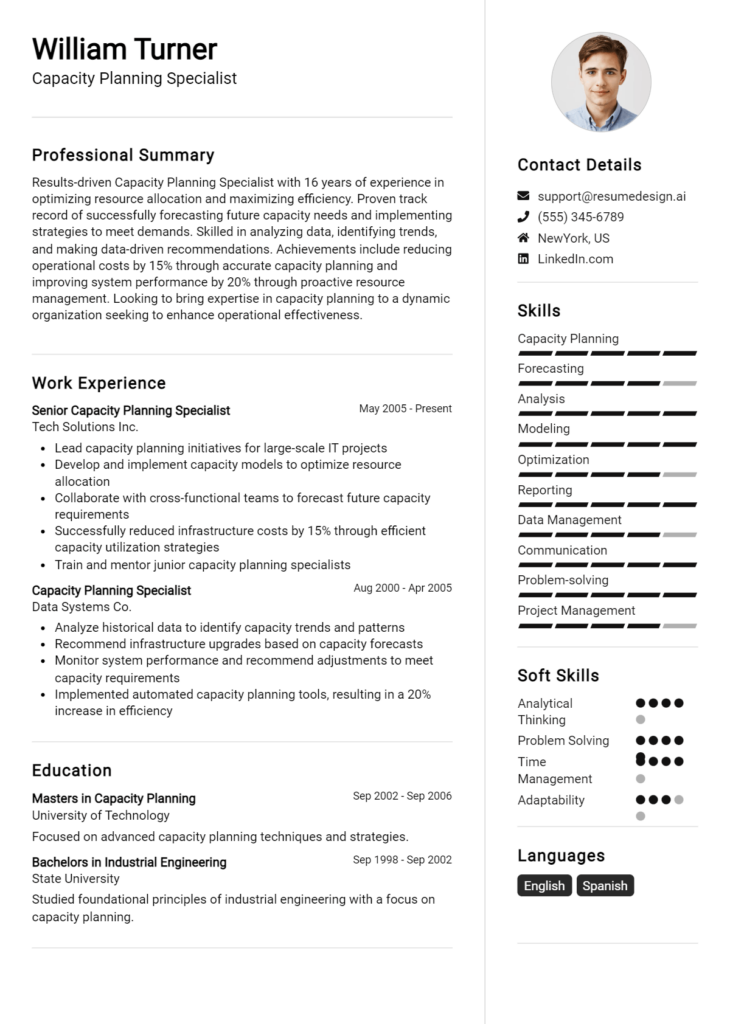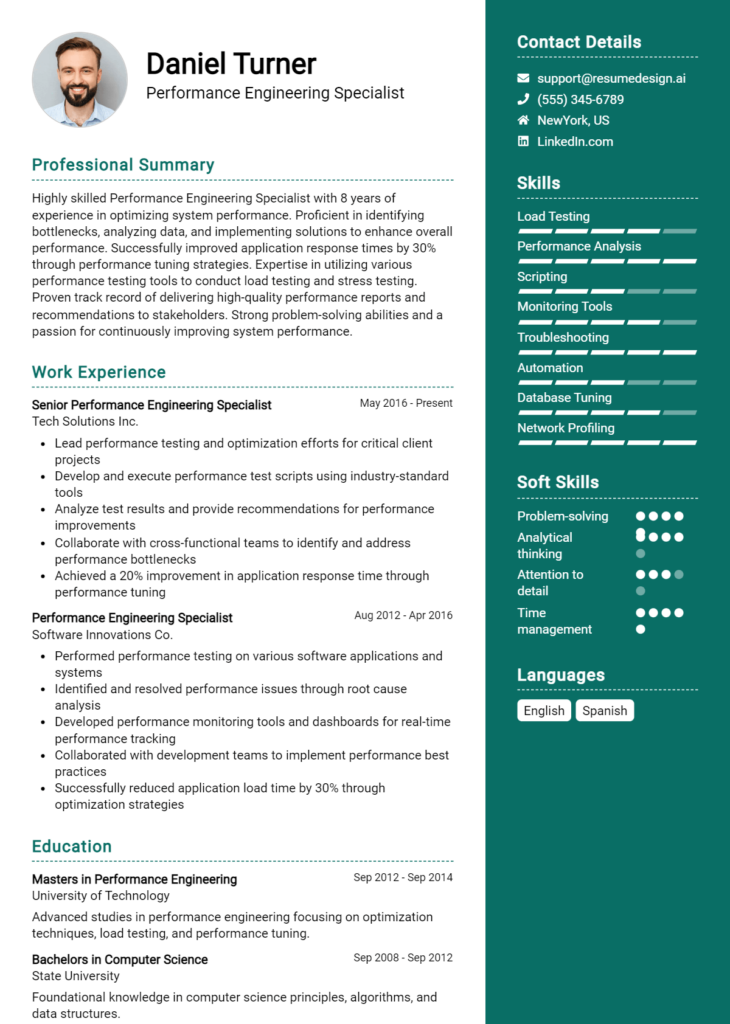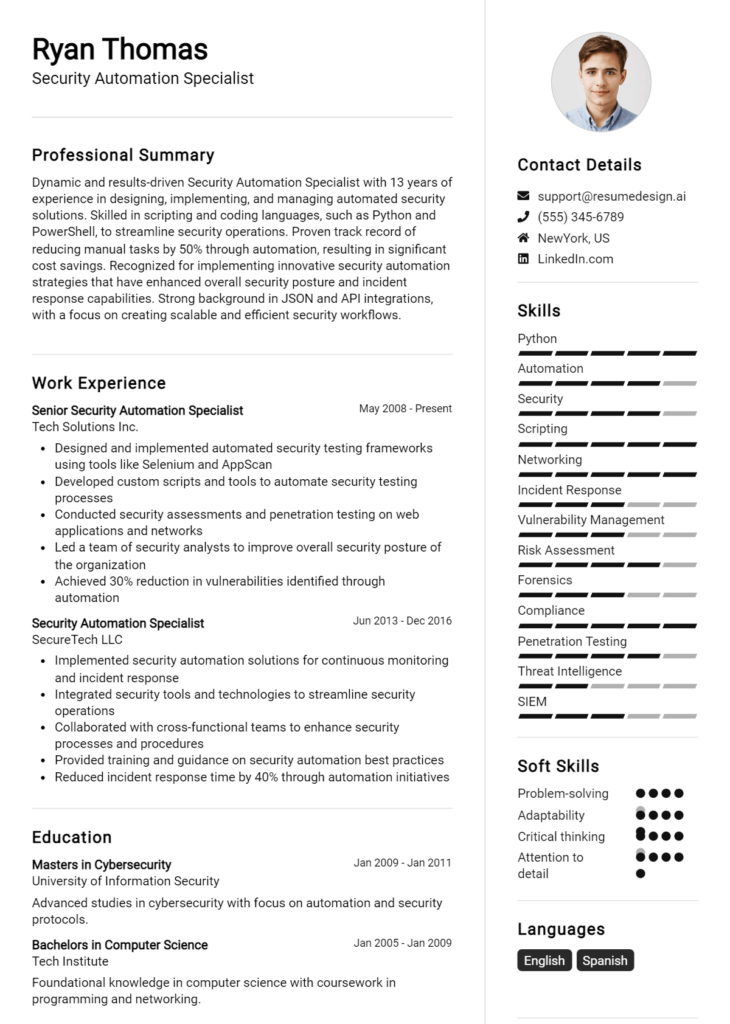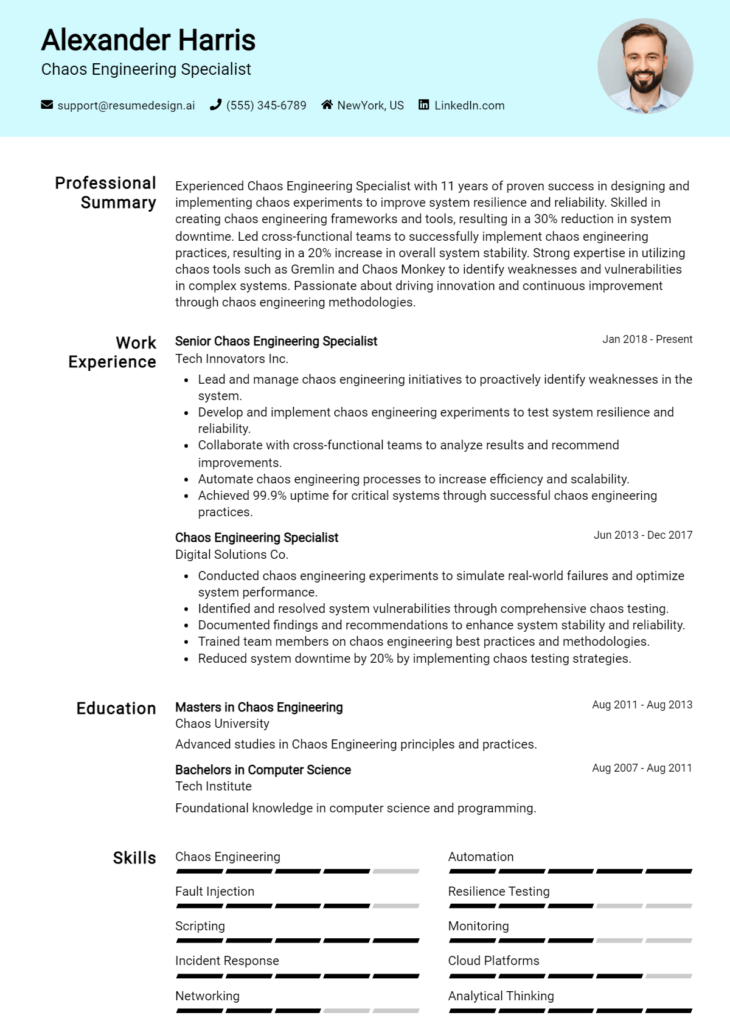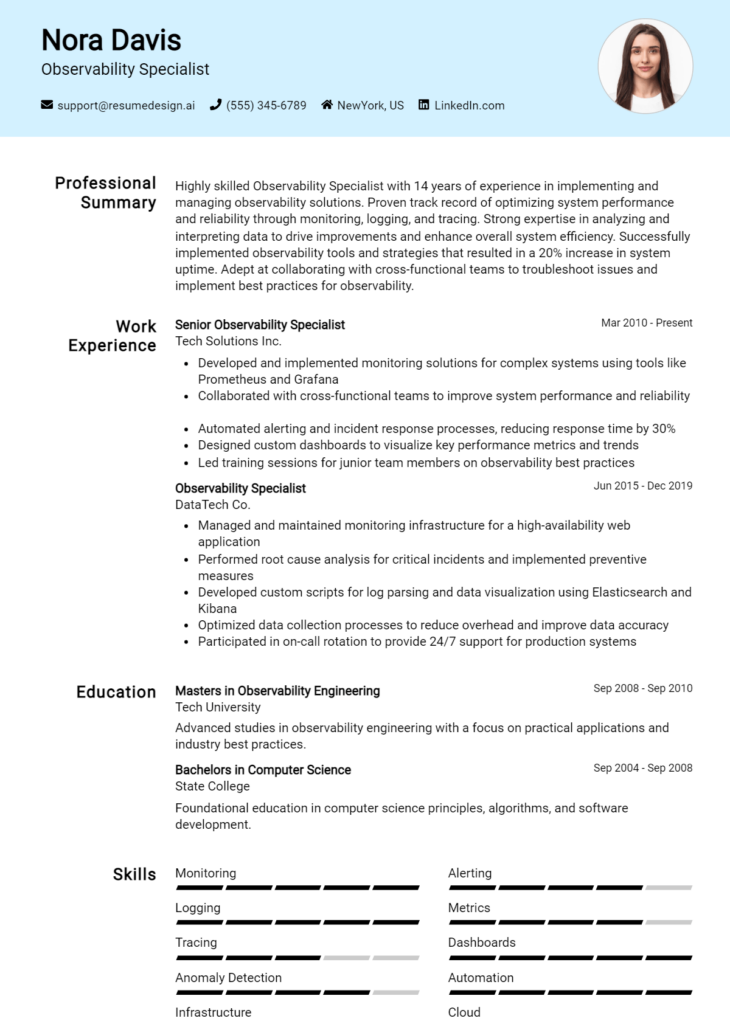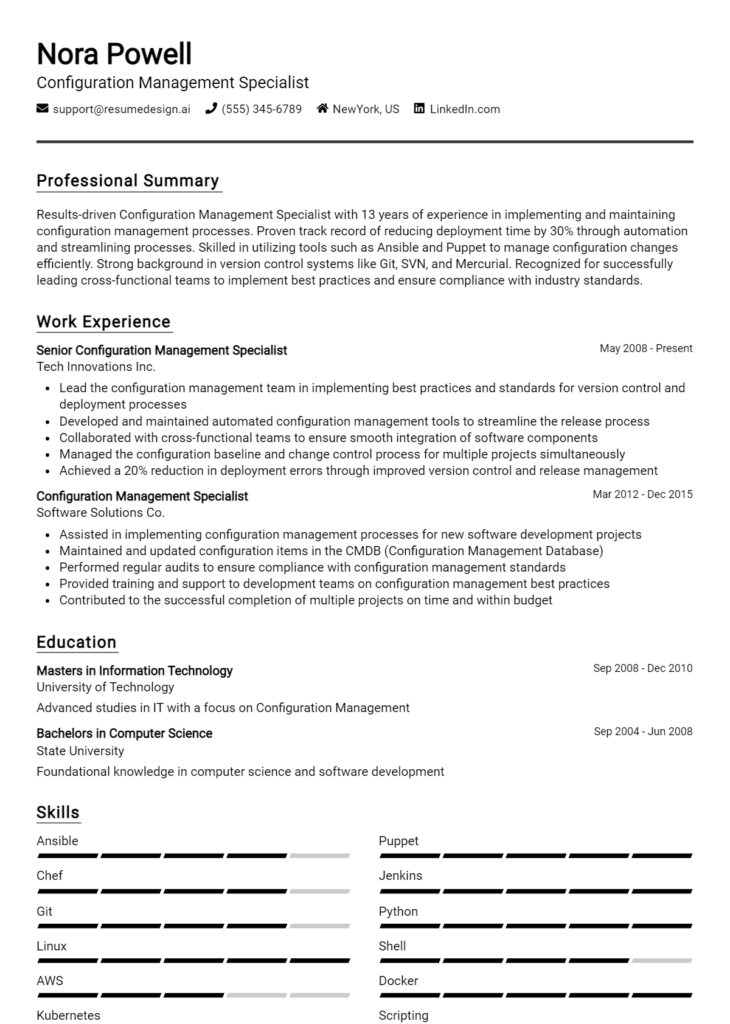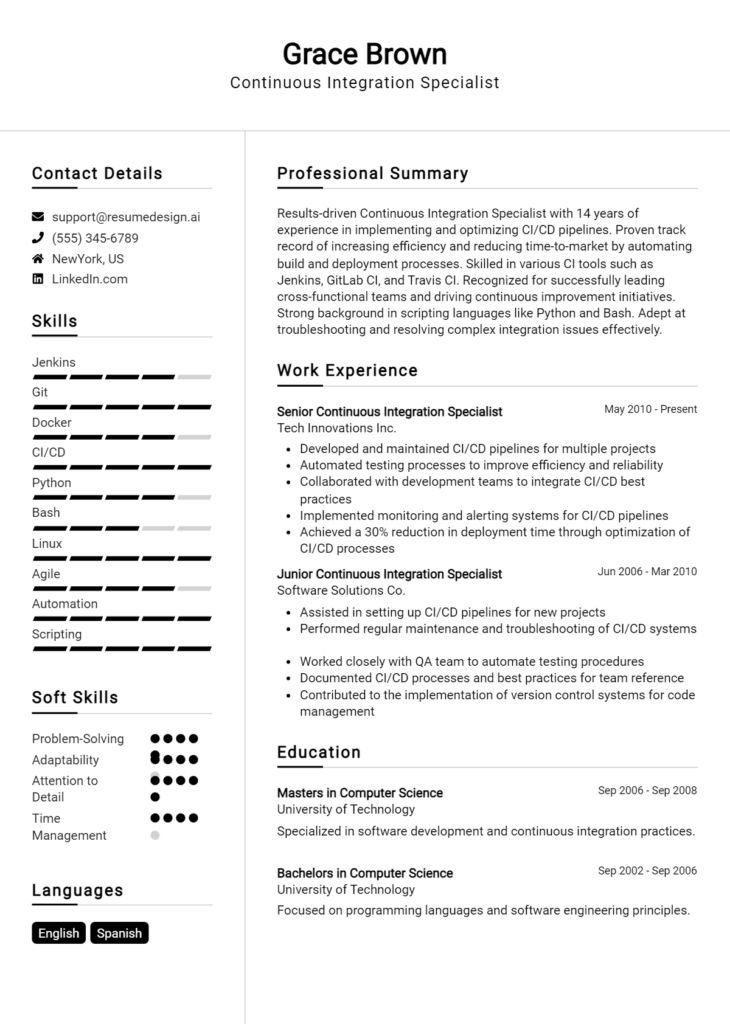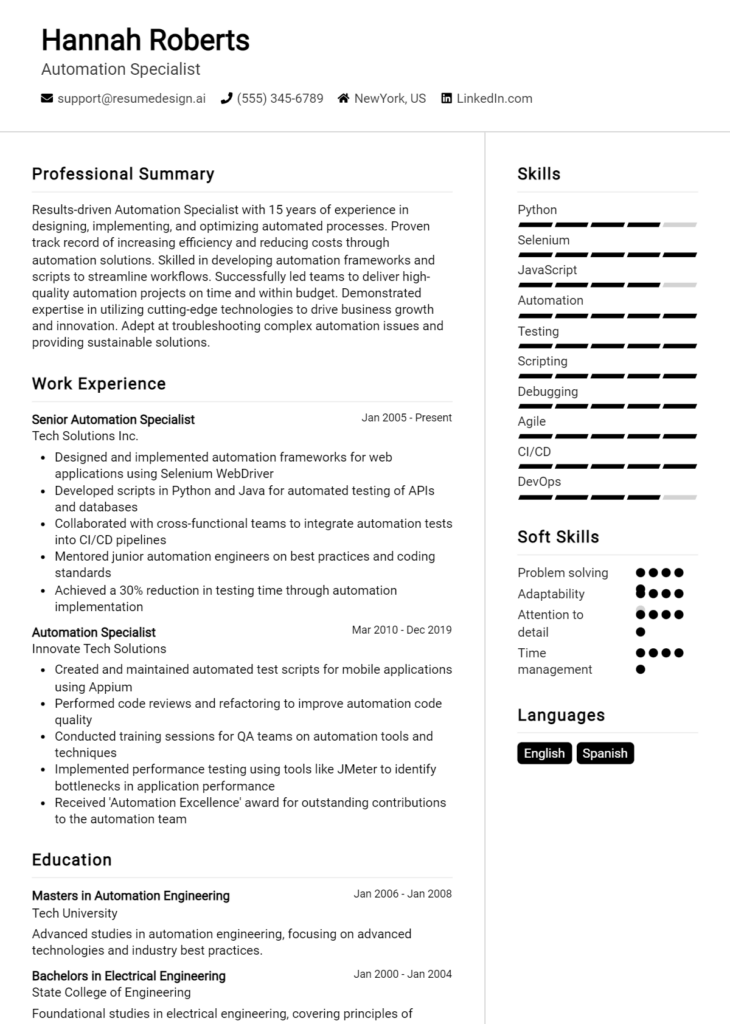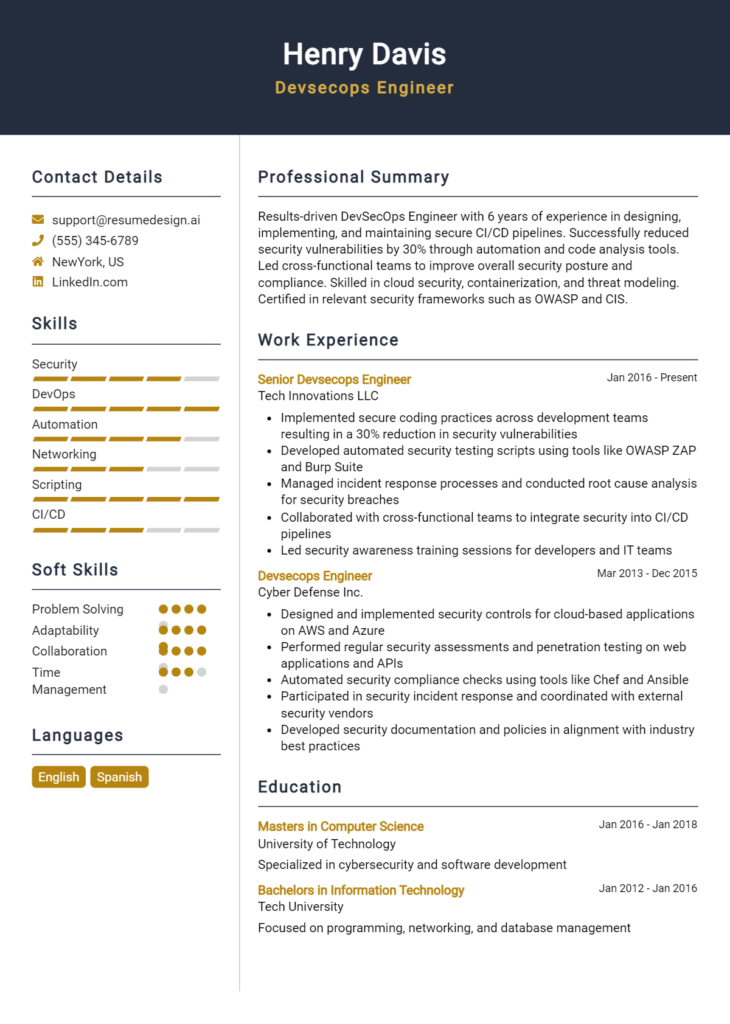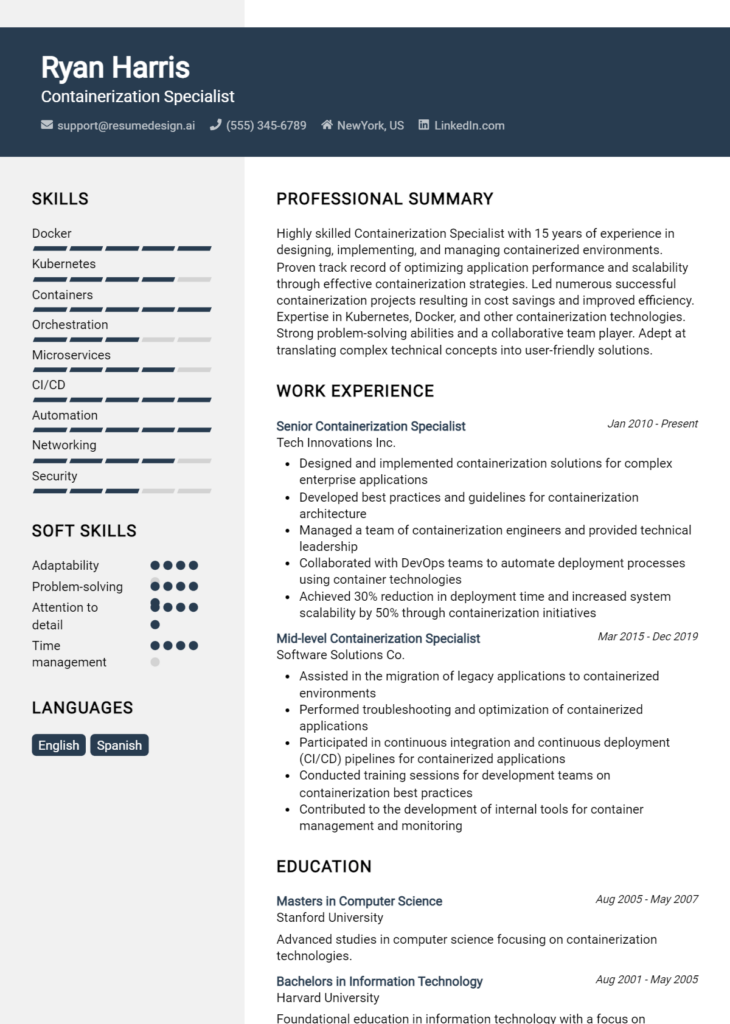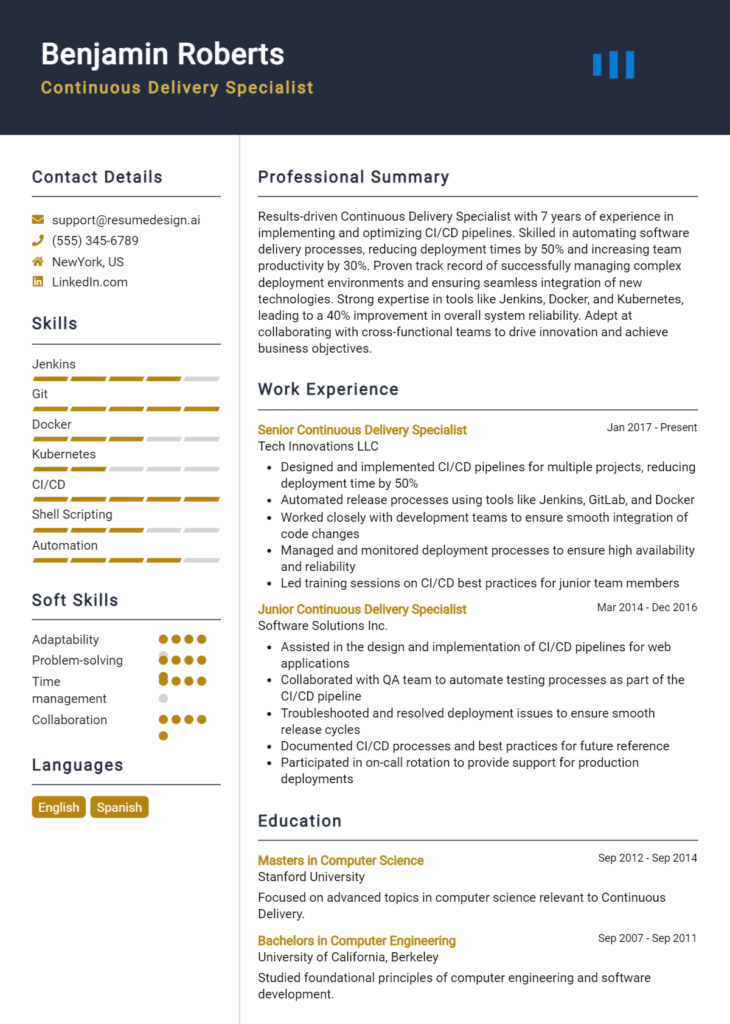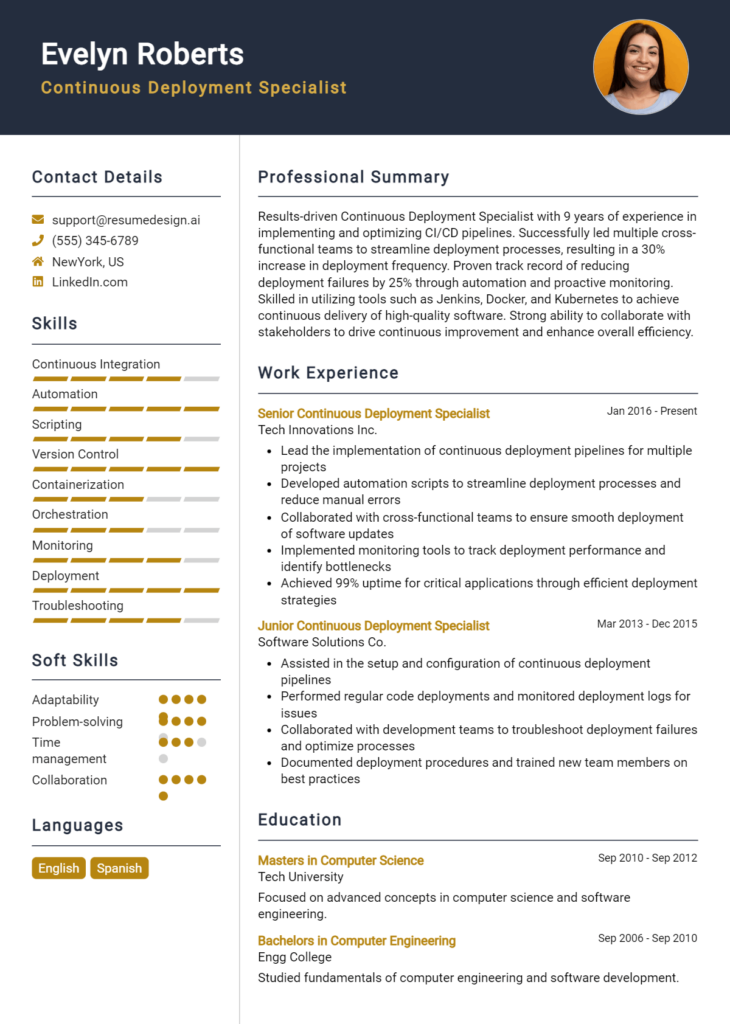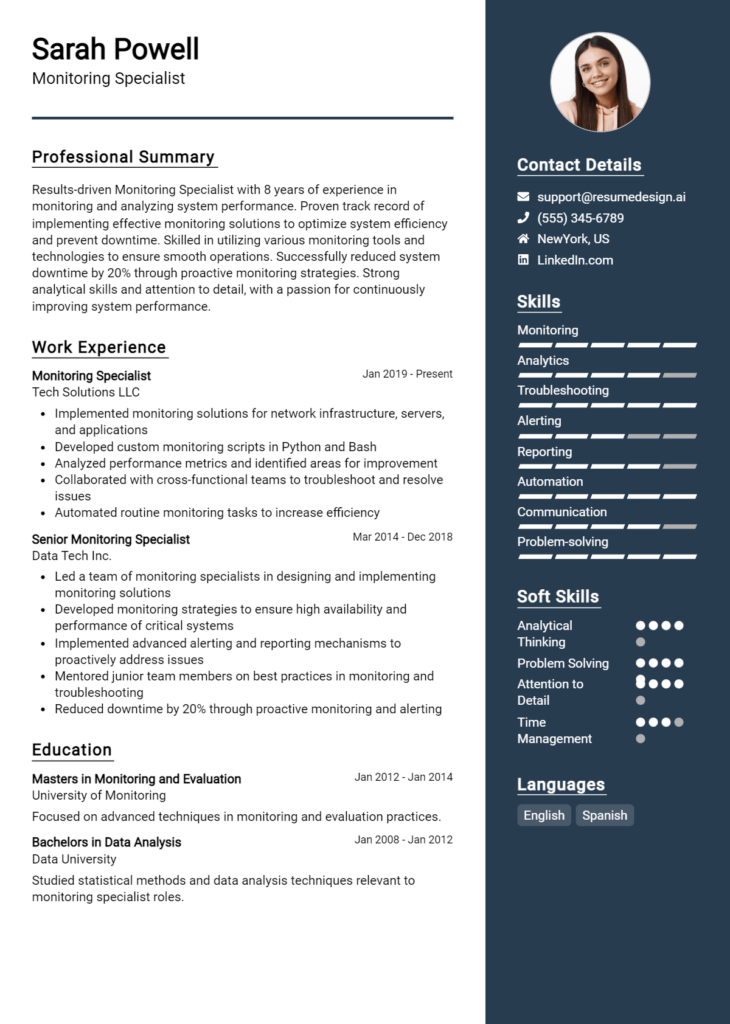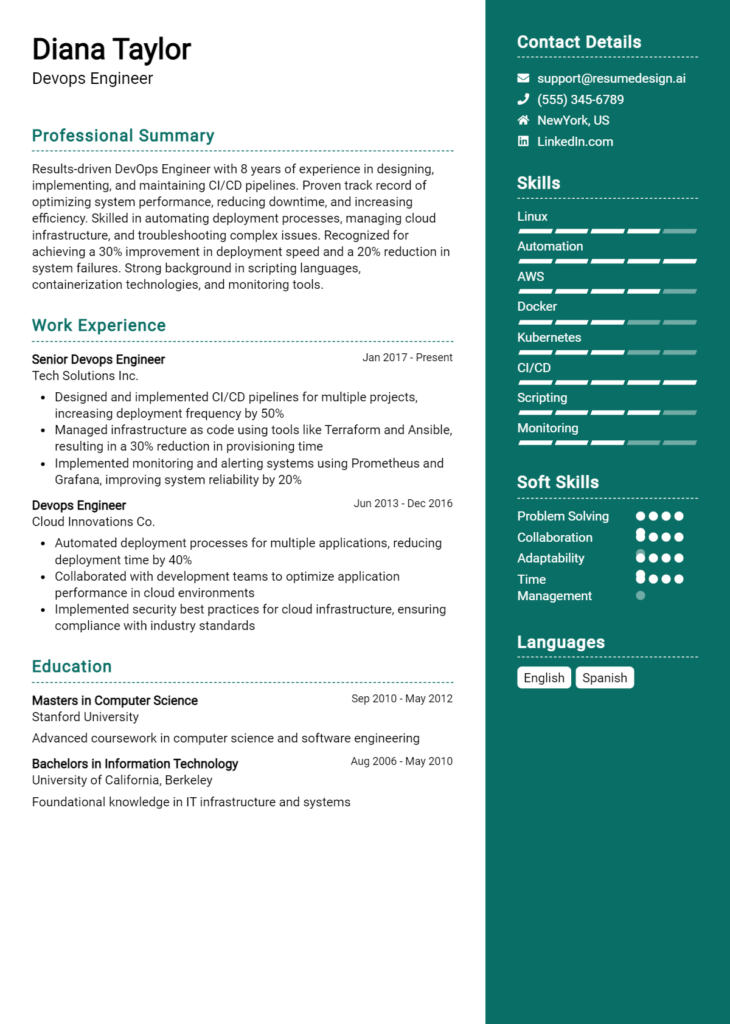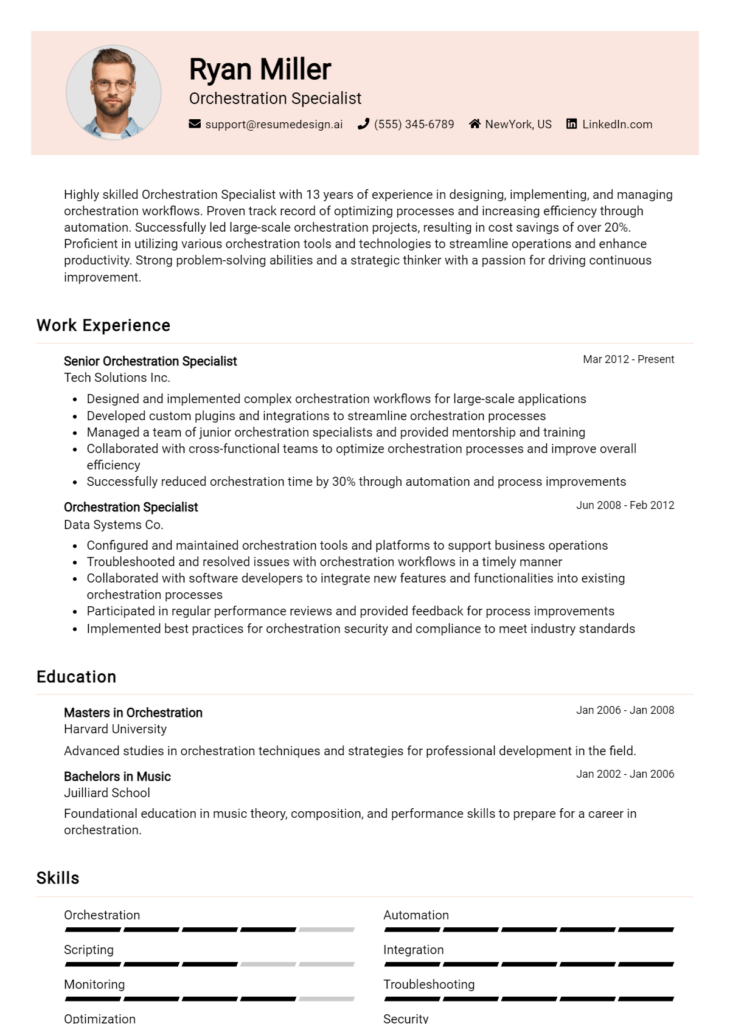Artifact Management Specialist Core Responsibilities
An Artifact Management Specialist plays a crucial role in overseeing the lifecycle of artifacts within an organization, ensuring their integrity and accessibility. This position requires strong technical skills in data management systems, operational expertise for efficient processes, and problem-solving abilities to address challenges across departments. By bridging functions such as IT, compliance, and project management, the specialist helps align artifact management with organizational goals. A well-structured resume highlighting these qualifications can significantly enhance job prospects.
Common Responsibilities Listed on Artifact Management Specialist Resume
- Develop and implement artifact management policies and procedures.
- Coordinate with cross-functional teams to ensure proper artifact handling.
- Maintain an organized inventory of all artifacts within the system.
- Monitor compliance with regulatory and organizational standards.
- Conduct regular audits to ensure data integrity and security.
- Assist in the training of staff on artifact management best practices.
- Collaborate with IT to optimize artifact storage solutions.
- Analyze and report on artifact usage and performance metrics.
- Resolve issues related to artifact retrieval and accessibility.
- Implement improvement initiatives for artifact management processes.
- Support project teams in managing project-related artifacts.
- Stay updated on industry trends and advancements in artifact management.
High-Level Resume Tips for Artifact Management Specialist Professionals
A well-crafted resume is crucial for Artifact Management Specialist professionals, as it serves as the first impression a candidate makes on potential employers. In a competitive job market, an effective resume not only outlines your skills and experiences but also showcases your unique achievements in the field of artifact management. It needs to reflect your proficiency in managing, preserving, and interpreting artifacts, while also appealing to the specific needs of the hiring organization. This guide will provide practical and actionable resume tips specifically tailored for Artifact Management Specialist professionals, helping you stand out in your pursuit of career advancement.
Top Resume Tips for Artifact Management Specialist Professionals
- Tailor your resume to each job description by incorporating keywords and phrases from the posting.
- Highlight relevant experience in artifact management, including internships, volunteer work, and previous positions.
- Quantify your achievements whenever possible, such as the number of artifacts managed or preservation projects completed.
- Showcase industry-specific skills, including knowledge of preservation techniques, cataloging software, and conservation practices.
- Include any certifications or training relevant to artifact management, such as a degree in museum studies or conservation.
- Utilize a clean and professional format that enhances readability and emphasizes important information.
- Incorporate a summary statement that succinctly outlines your expertise and career goals in artifact management.
- List any publications or presentations you have contributed to in the field, as they demonstrate your commitment and expertise.
- Use action verbs to describe your responsibilities and achievements, making your contributions stand out.
- Proofread your resume multiple times to eliminate any errors, ensuring a polished final product.
By implementing these tips, you can significantly enhance the effectiveness of your resume, making it more likely to capture the attention of hiring managers in the Artifact Management Specialist field. A targeted and well-structured resume will not only reflect your qualifications but also demonstrate your genuine interest and commitment to the profession, ultimately increasing your chances of landing that coveted job.
Why Resume Headlines & Titles are Important for Artifact Management Specialist
In the competitive field of artifact management, a well-crafted resume headline or title serves as the first impression a hiring manager will have of a candidate. This crucial element acts as a powerful summary, encapsulating a candidate's key qualifications and expertise in just a few words. A strong headline can immediately grab attention, setting the tone for the rest of the resume and enticing decision-makers to delve deeper into the applicant's experience. To be effective, these headlines should be concise, relevant, and directly aligned with the job being applied for, ensuring that they resonate with the specific requirements and expectations of the role.
Best Practices for Crafting Resume Headlines for Artifact Management Specialist
- Keep it concise: Aim for a headline that is no longer than 10-12 words.
- Be role-specific: Include keywords related to artifact management to highlight your expertise.
- Showcase your value: Focus on what makes you a strong candidate, such as unique skills or experiences.
- Use action-oriented language: Start with powerful action verbs to convey confidence.
- Tailor for each application: Customize your headline for each job to reflect the specific requirements.
- Include relevant certifications: Mention any certifications or qualifications that demonstrate your expertise.
- Avoid jargon: Use clear language that can be easily understood by hiring managers.
- Make it impactful: Choose words that resonate and create a strong impression about your capabilities.
Example Resume Headlines for Artifact Management Specialist
Strong Resume Headlines
Expert Artifact Management Specialist with 5+ Years in Cultural Heritage Preservation
Results-Driven Artifact Management Professional Skilled in Digital Archiving and Curatorial Practices
Certified Artifact Management Specialist: Proven Track Record in Collection Management and Conservation
Weak Resume Headlines
Job Seeker Looking for Opportunities
Experienced Professional in Various Fields
The strong headlines effectively convey specific skills and experiences that are directly relevant to the position of an Artifact Management Specialist, showcasing the candidate’s qualifications in a compelling way. They utilize impactful language and relevant keywords that immediately clarify the candidate's suitability for the role. In contrast, the weak headlines lack specificity and fail to highlight any unique strengths, making them less memorable and engaging to hiring managers. These generic phrases do not provide a clear picture of the candidate's qualifications or what they bring to the table, ultimately diminishing their chances for consideration.
Writing an Exceptional Artifact Management Specialist Resume Summary
A well-crafted resume summary is a vital component for an Artifact Management Specialist, as it serves as the first impression for hiring managers. A strong summary succinctly highlights key skills, relevant experience, and significant accomplishments, enabling candidates to stand out in a competitive job market. By clearly outlining qualifications tailored to the specific job, a resume summary captures attention quickly, encouraging employers to delve deeper into the resume. It should be concise and impactful, effectively summarizing the candidate's professional identity and value proposition.
Best Practices for Writing a Artifact Management Specialist Resume Summary
- Quantify Achievements: Use numbers or percentages to demonstrate impact and effectiveness.
- Focus on Key Skills: Highlight specific skills that align with the job description, such as data management or compliance knowledge.
- Tailor for the Job: Customize the summary for each application to reflect the qualifications sought by the employer.
- Be Concise: Keep the summary brief, ideally within 2-4 sentences, to maintain reader interest.
- Use Action Verbs: Start with strong action verbs to convey a sense of proactivity and results-driven mindset.
- Highlight Relevant Experience: Include specific job-related experiences that demonstrate your capability in artifact management.
- Showcase Certifications: Mention any relevant certifications that enhance your suitability for the role.
- Maintain Professional Tone: Ensure the language is formal and aligns with industry standards.
Example Artifact Management Specialist Resume Summaries
Strong Resume Summaries
Results-driven Artifact Management Specialist with over 5 years of experience in digital archiving and preservation. Successfully managed over 10,000 artifacts, implementing enhanced cataloging systems that improved retrieval times by 30%.
Detail-oriented professional with expertise in artifact lifecycle management and compliance. Achieved a 95% accuracy rate in data entry and management, contributing to a streamlined inventory system that reduced errors by 20%.
Certified Artifact Management Specialist skilled in metadata standards and digital asset management. Spearheaded a project that digitized 2,000 historical documents, increasing public access and engagement by 40%.
Weak Resume Summaries
Experienced professional looking for a job in artifact management. I have worked in various roles and can handle many tasks.
Artifact Management Specialist with some experience. I am a team player and hope to find a position where I can contribute.
The examples of strong resume summaries effectively demonstrate the candidate's achievements and relevant skills, showcasing quantifiable results and direct applicability to the role. In contrast, the weak summaries lack specificity, fail to quantify outcomes, and present generic statements that do not convey the candidate's unique qualifications. This illustrates the importance of being clear and impactful in a resume summary to capture the attention of hiring managers.
Work Experience Section for Artifact Management Specialist Resume
The work experience section of an Artifact Management Specialist resume is critical in demonstrating a candidate's proficiency in managing artifacts and their ability to lead teams effectively. This section provides a platform for candidates to showcase their technical skills, highlight their experience in delivering high-quality products, and illustrate their capacity for collaboration within cross-functional teams. By quantifying achievements and aligning their experience with industry standards, candidates can present a compelling narrative that not only reflects their past contributions but also positions them as valuable assets for future employers.
Best Practices for Artifact Management Specialist Work Experience
- Utilize industry-specific terminology to demonstrate expertise in artifact management.
- Quantify accomplishments with metrics to provide tangible evidence of success.
- Highlight specific technical skills, such as proficiency with artifact repositories and version control systems.
- Emphasize leadership roles and responsibilities in managing teams or projects.
- Showcase collaboration with different departments to illustrate teamwork capabilities.
- Detail the impact of your contributions on project timelines and product quality.
- Align your experiences with recognized industry standards and best practices.
- Tailor the work experience section to match the job description and desired qualifications of the role.
Example Work Experiences for Artifact Management Specialist
Strong Experiences
- Led a cross-functional team of 10 in the successful migration of 200+ legacy artifacts to a new repository, resulting in a 30% reduction in retrieval time.
- Implemented a version control strategy that decreased deployment errors by 25%, enhancing product reliability and customer satisfaction.
- Streamlined the artifact lifecycle process, cutting the time from development to production by 40%, which significantly accelerated project delivery timelines.
- Collaborated with QA and DevOps teams to establish best practices for artifact management, leading to a 50% increase in efficiency during the release cycle.
Weak Experiences
- Managed artifacts for various projects without detailing specific outcomes or processes.
- Participated in team meetings to discuss artifact-related issues without showcasing any leadership or contributions.
- Worked on artifact management tasks as assigned without quantifying any results or improvements.
- Assisted with the organization of artifacts but did not provide evidence of technical skills or collaboration.
The examples provided illustrate a clear distinction between strong and weak experiences. Strong experiences are characterized by specific, quantifiable outcomes that highlight the candidate's technical leadership and collaborative efforts. They demonstrate a proactive approach and a clear impact on project success. In contrast, weak experiences lack detail, quantification, and clear relevance to the role, making it difficult for potential employers to gauge the candidate's true capabilities and contributions in artifact management.
Education and Certifications Section for Artifact Management Specialist Resume
The education and certifications section of an Artifact Management Specialist resume is crucial as it serves to showcase the candidate's academic qualifications, relevant industry certifications, and commitment to continuous professional development. This section is the candidate's opportunity to provide evidence of their expertise in artifact management, including any specialized training that aligns with the requirements of the role. By listing pertinent coursework and recognized certifications, candidates can significantly enhance their credibility and demonstrate their alignment with the expectations of potential employers, thus making a compelling case for their suitability for the position.
Best Practices for Artifact Management Specialist Education and Certifications
- Focus on relevant degrees, such as a Bachelor's or Master's in Library Science, Information Management, or a related field.
- Include industry-recognized certifications, such as Certified Archivist (CA) or Digital Archives Specialist (DAS).
- Highlight specialized training or workshops that pertain to artifact preservation, cataloging, or digital curation.
- Provide a brief description of relevant coursework that directly relates to artifact management.
- List certifications that demonstrate compliance with current industry standards and practices.
- Prioritize recent and up-to-date educational credentials over outdated qualifications.
- Be specific about the institution or organization granting your certifications to enhance credibility.
- Consider including any continuing education credits or professional development courses to show ongoing learning.
Example Education and Certifications for Artifact Management Specialist
Strong Examples
- Bachelor of Arts in History, University of Anytown, 2020
- Certified Archivist (CA) – Academy of Certified Archivists, 2021
- Digital Curation and Preservation Certificate – Anytown University, 2022
- Coursework in Archival Science and Records Management – University of Anytown
Weak Examples
- Bachelor of Arts in Philosophy, University of Anytown, 2015
- Certification in Basic Computer Skills – Anytown Community College, 2018
- Online Course in General History – MOOCs, 2020
- High School Diploma, Anytown High School, 2010
The strong examples are considered relevant because they directly pertain to artifact management, showcasing specialized knowledge and recognized credentials that enhance the candidate's qualifications for the role. Conversely, the weak examples lack relevance, featuring degrees and certifications that do not align with the key competencies required for an Artifact Management Specialist, thereby diminishing the candidate's appeal to prospective employers.
Top Skills & Keywords for Artifact Management Specialist Resume
As an Artifact Management Specialist, possessing the right set of skills is crucial for success in this role. These professionals play a significant part in overseeing and managing artifacts, ensuring their preservation, and facilitating access to these important resources. A well-crafted resume highlighting relevant skills not only showcases your expertise but also sets you apart in a competitive job market. By focusing on both soft and hard skills, candidates can effectively demonstrate their comprehensive understanding of artifact management principles and practices. Strong skills enhance the ability to communicate, collaborate, and innovate, making them essential components of a standout resume. For those seeking to refine their resumes, exploring the right skills and detailing pertinent work experience can greatly improve job prospects.
Top Hard & Soft Skills for Artifact Management Specialist
Soft Skills
- Attention to Detail
- Effective Communication
- Problem-Solving Skills
- Team Collaboration
- Adaptability
- Time Management
- Critical Thinking
- Organizational Skills
- Customer Service Orientation
- Empathy
Hard Skills
- Knowledge of Artifact Preservation Techniques
- Proficiency in Digital Asset Management Systems
- Understanding of Cataloging Standards (e.g., MARC, DACS)
- Familiarity with Conservation Methods
- Experience with Inventory Management Software
- Research and Documentation Skills
- Data Analysis and Reporting
- Project Management Skills
- Metadata Creation and Management
- Knowledge of Legal and Ethical Issues in Artifact Management
Stand Out with a Winning Artifact Management Specialist Cover Letter
Dear Hiring Manager,
I am writing to express my interest in the Artifact Management Specialist position at [Company Name], as advertised on [Job Board/Company Website]. With a robust background in archival science and a passion for the preservation of cultural heritage, I am excited about the opportunity to contribute to your team. My experience in managing collections and my meticulous attention to detail make me an ideal candidate for this role.
During my previous role at [Previous Company Name], I successfully implemented a comprehensive artifact management system that improved accessibility and preservation efforts across our collection. By collaborating with cross-functional teams, I developed best practices for cataloging, storage, and digitization, ensuring that both physical and digital artifacts were properly maintained. My proficiency in using various collection management software, combined with my strong analytical skills, has enabled me to streamline processes and enhance operational efficiency.
I am particularly drawn to [Company Name] because of your commitment to [specific mission, value, or project related to artifact management]. I admire your dedication to not only preserving artifacts but also making them accessible to the public and fostering educational initiatives. I am eager to bring my expertise in artifact management and my passion for cultural heritage to your organization, helping to safeguard and promote your collections for future generations.
Thank you for considering my application. I look forward to the opportunity to discuss how my skills and experiences align with the needs of your team. I am excited about the possibility of contributing to [Company Name] and am available for an interview at your earliest convenience.
Sincerely,
[Your Name]
[Your LinkedIn Profile]
[Your Phone Number]
[Your Email Address]
Common Mistakes to Avoid in a Artifact Management Specialist Resume
When crafting a resume for the role of an Artifact Management Specialist, it’s essential to present your skills and experiences effectively. However, many candidates make common mistakes that can undermine their chances of landing an interview. Awareness of these pitfalls can help you create a compelling and professional resume that highlights your qualifications. Below are some typical mistakes to avoid:
Vague Job Descriptions: Failing to provide specific details about previous roles can leave hiring managers unclear about your responsibilities and accomplishments. Use quantifiable metrics to showcase your impact.
Ignoring Keywords: Many organizations use Applicant Tracking Systems (ATS) to filter resumes. Not incorporating industry-specific keywords can result in your resume being overlooked.
Overloading with Technical Jargon: While it’s important to demonstrate expertise, using too much technical language can alienate readers. Ensure your resume balances technical terms with clear explanations.
Lack of Tailoring: Sending a generic resume for every application can be detrimental. Customize your resume for each job by aligning your skills and experiences with the specific requirements of the role.
Neglecting Soft Skills: Artifact Management Specialists require strong communication and project management skills. Omitting these can leave your resume feeling one-dimensional.
Poor Formatting: A cluttered or unprofessional layout can distract from your qualifications. Use clear headings, bullet points, and consistent formatting to enhance readability.
Focusing Too Much on Responsibilities: While listing duties is important, emphasizing achievements and results is crucial. Highlight what you accomplished in each role rather than just what you were responsible for.
Ignoring the Cover Letter: Some candidates overlook the importance of a cover letter, missing an opportunity to expand on their resume and convey their passion for the role. Always include a well-crafted cover letter to complement your application.
Conclusion
As an Artifact Management Specialist, your role is crucial in overseeing the lifecycle of artifacts within an organization, ensuring their proper documentation, storage, and retrieval. Key responsibilities include managing digital assets, implementing effective version control practices, and collaborating with cross-functional teams to maintain consistency across projects. Additionally, staying updated with the latest tools and technologies is essential for optimizing artifact management processes.
In conclusion, to stand out in this competitive field, it’s important to have a polished resume that highlights your skills and experiences effectively. We encourage you to review your Artifact Management Specialist Resume and ensure it aligns with industry standards.
Take advantage of the resources available to you, such as resume templates, which can help you create a visually appealing layout. For a more personalized touch, consider using the resume builder that guides you through the process step-by-step. If you're looking for inspiration, explore resume examples tailored for your role. Don’t forget the importance of a compelling introduction with a well-crafted cover letter; check out our cover letter templates to get started.
Take the next step in your career today!

